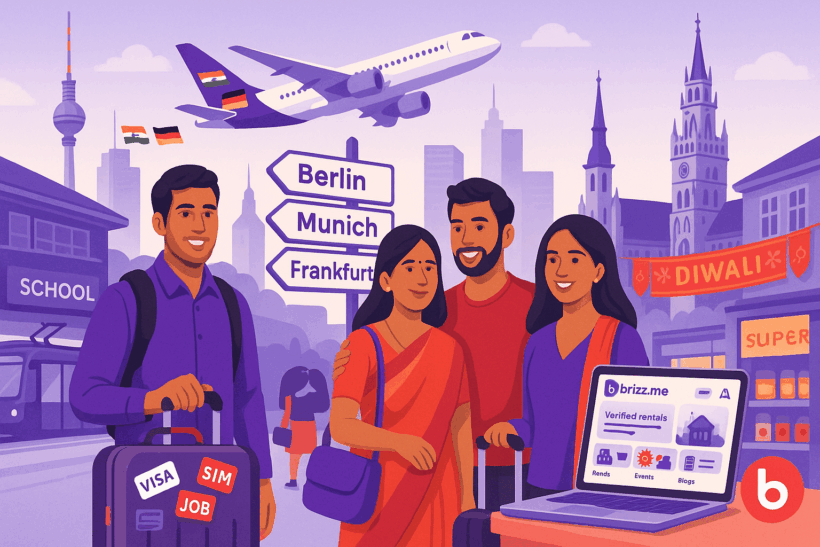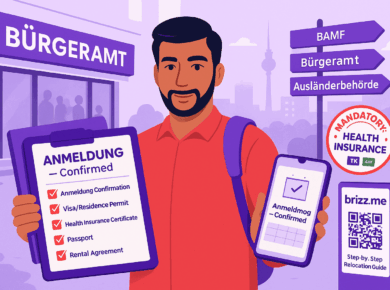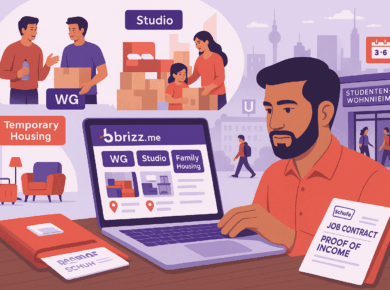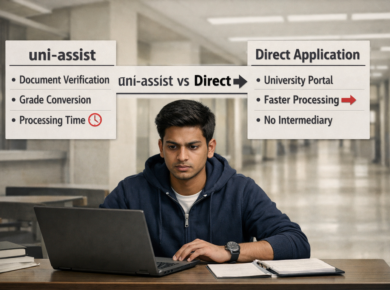Hey there, future Deutschland explorers! How are you? or should I say Wie geht’s? 😉
Are you an expat plan to moving to Germany?
Whether you’re chasing your dream job, joining your spouse, seeking world-class education, or embarking on a new adventure with your family, shifting from India is no less than a thrilling ride… sprinkled with a few “Wait, what?!” moments along the way.
But hey — there’s nothing to worry about because Brizz.me and I have it all sorted for you. From step-by-step guides on Anmeldung (City Registration), Mietvertrag (Rental contracts), and Opening a bank account in Germany to practical tips on relocating to Germany, we make settling in seamless. On Brizz.me, you’ll find verified rental homes, trusted Indian services, and even cultural events happening around you. Whether it’s securing your first apartment, booking your first local service, or attending your first Indian event in Germany, Brizz.me is here to make your move simple and stress-free.
Germany for Indians is exciting: world-class public transport (which is almost punctual 🙈), breathtaking cities, top-notch universities, and — yes — coriander and curry leaves in the freezer aisle once you know where to look. 😄
But I won’t lie, from Anmeldung to Schufa, it’s a bureaucratic jungle. So, let’s break it down into practical steps. Bookmark this — it’s your personal map from Delhi to Düsseldorf or Mumbai to Munich!it is the starter guide for expats.
How to Find Rental spaces in Germany as an Expat before moving to Germany
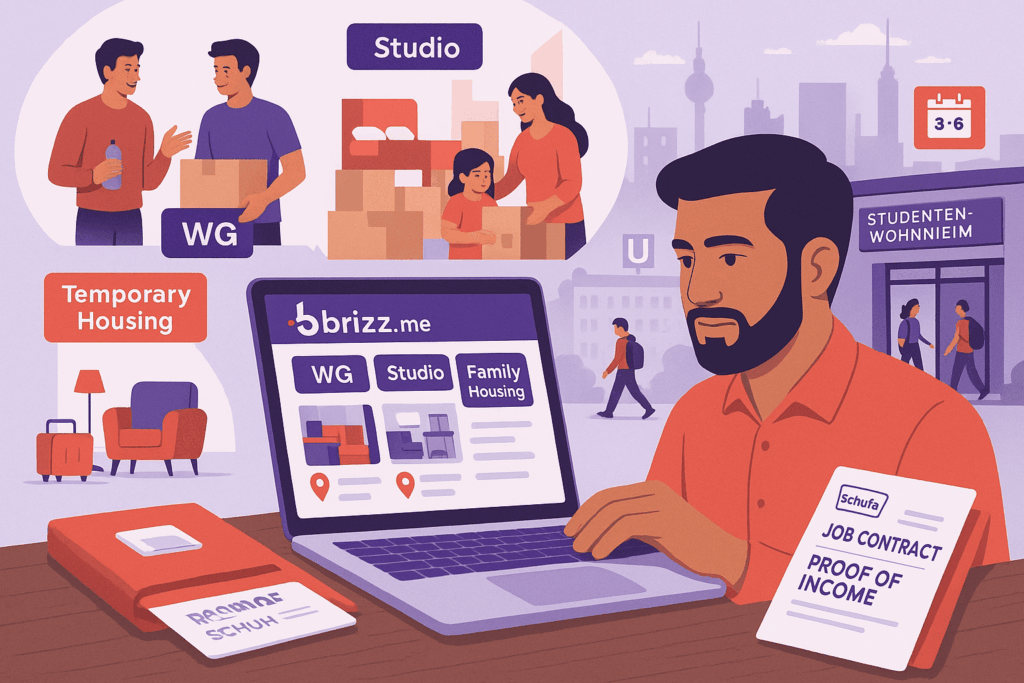
First things first—finding accommodation is your top priority. The rental market in Germany, especially in Berlin, Frankfurt, and Munich, moves fast, so start early. Without a rental agreement, you can’t register your address. While popular platforms like WG-Gesucht, ImmoScout24, and HousingAnywhere are widely used, Brizz.me is a great place to start. Brizz.me offers a community-first approach with verified rentals, apartments, houses, and roommate listings shared by fellow Indian expats.renting an apartment in Germany is not simple.
- Temporary housing: Try Airbnb, Wunderflats, or serviced apartments until you secure a long-term place.
- WG (Wohngemeinschaft): Perfect for students or singles — shared flats save rent and help you make friends quickly.
- Studio apartments or family housing: Great for couples and families, but be prepared: landlords often require income proof, Schufa score, job contracts, and sometimes a letter of motivation.
- Studentwohnheim (Student dormitory): The most affordable housing platform for students. They offer all kinds of housing solutions from single rooms to small apartments. The only catch is you need to apply 3-6 months in advance due to waiting lists.
👉 To deep dive into this topic, check out our complete housing guide.
German Visas and Anmeldung in Germany requirements
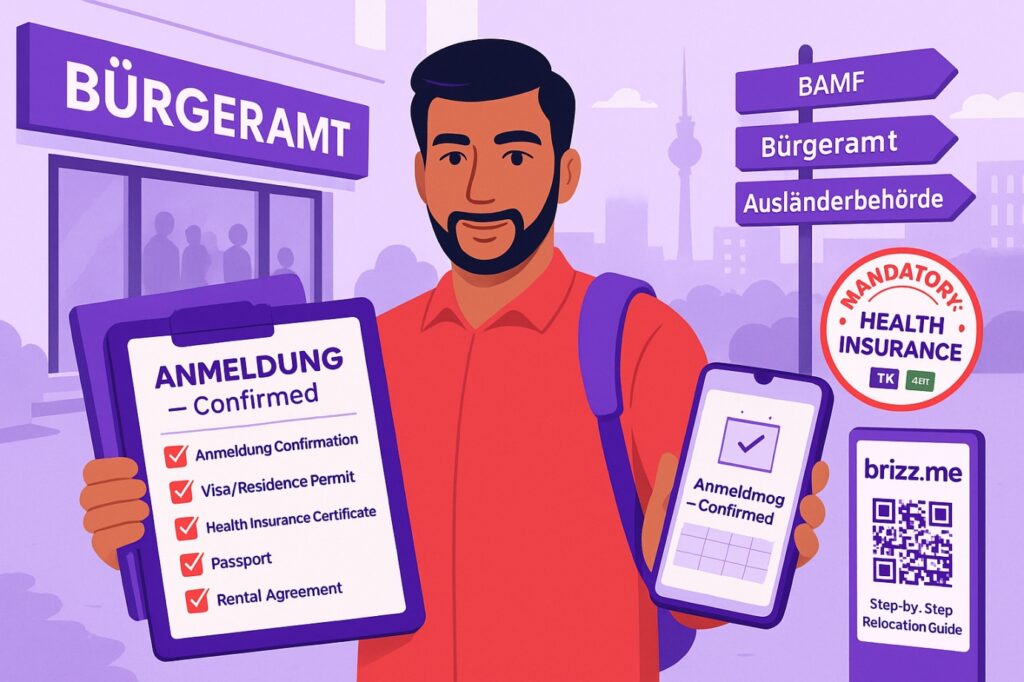
- Anmeldung — your passport to everything: This is your official German address registration. Without it, you can’t get a SIM card, open a bank account, or receive Amazon deliveries. My advice, book an appointment beforehand, the waiting times for an appointment can be your first “Wait…WHAT?” moment, especially if you are going to live in big cities like Berlin and Frankfurt.
- German Visas & Residence Permits: As an Indian expat in Germany (unlike EU citizens who don’t need one), you usually arrive with a National D-Visa. This visa is valid for entry and short-term stay, but after arrival you must apply for a residence permit to legally continue living in Germany. The type of residence permit depends on your purpose of stay—such as a student visa, Blue Card, dependent visa, or freelance visa.
Once the Anmeldung process is complete, you need to book an appointment at the Ausländerbehörde (Foreigner’s Office) in the city where you live. This office handles residence permit applications and visa extensions. Because waiting times can be 3 to 6 months, it’s crucial to book your appointment as early as possible. To find the correct office, search for “Ausländerbehörde” + your city name.
- Obtain health insurance — it’s mandatory: Germany is known as the land of insurance, and the first must-have is health insurance. All residents in Germany must have health insurance, either public (gesetzliche Krankenversicherung) or private. Without it, you can’t enroll at a university, get a residence permit, or sometimes even sign a job contract.
Popular providers for public health insurance (GKV), include TK – Techniker Krankenkasse and AOK; For private health insurance (PKV), expats often consider providers like Ottonova.
With time in Germany, you’ll slowly build your own insurance starter pack—from liability and household to legal and travel health insurance—because that’s just how life in the “land of insurance” works. 😉
👉 Read our detailed guides on health insurance in Germany and how to use it right
- Know the jargon: BAMF, Ausländerbehörde, Bürgeramt: Yes, the names sound wild, but these government offices are crucial for legalizing your stay. You’ll hear them a lot — better get used to them.
- Always carry copies: Germans love documentation. Keep physical + digital copies of your passport, insurance papers, rental agreement, visa, degree certificates, and other official documents.
- Bureaucracy is paperwork-heavy: Processes can be slow and often require multiple appointments. Keep several copies of every document and have lots of patience.
👉 Go through our fun blog that will make you aware of some shocking German Quirks.
3. Opening a Bank Account in Germany
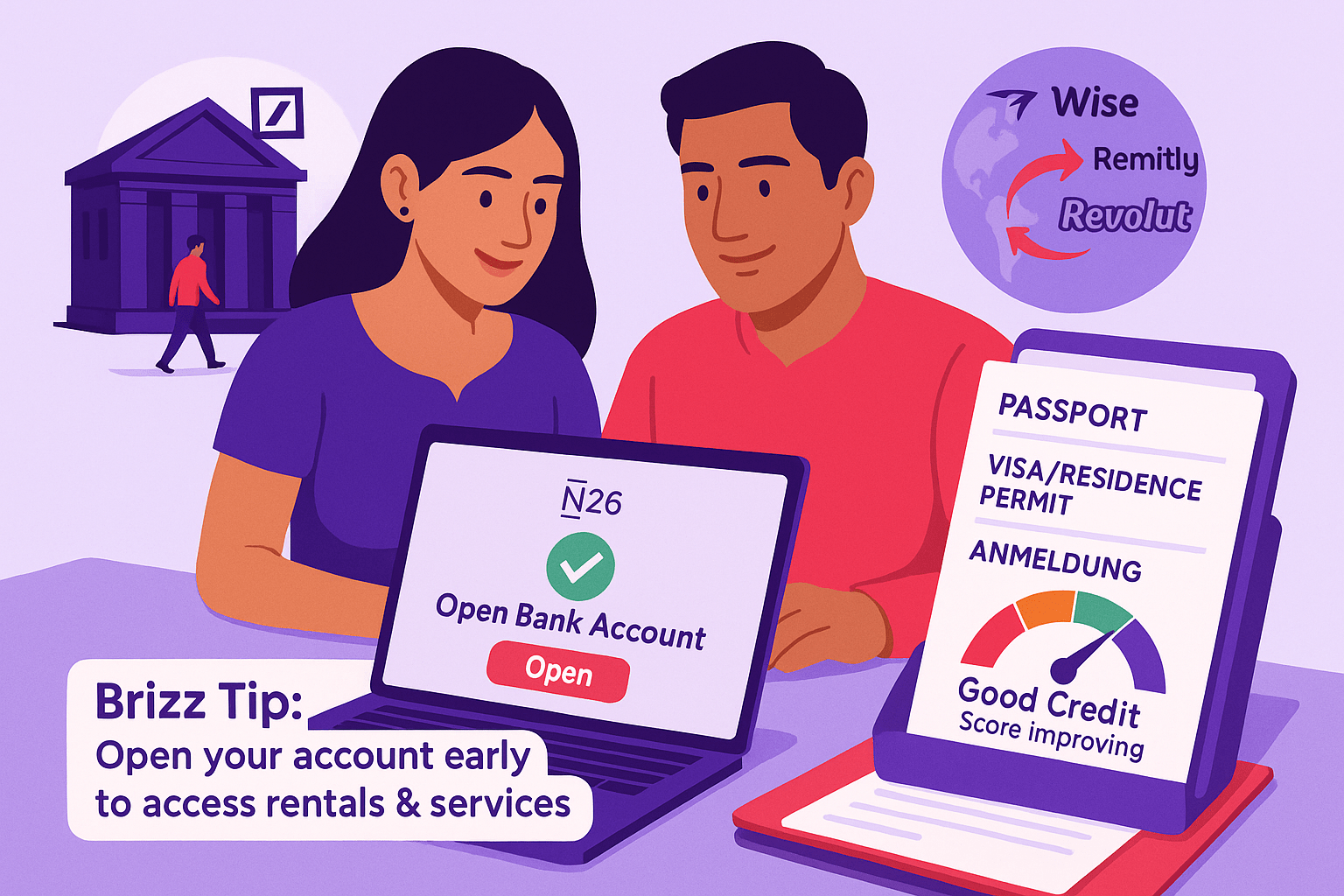
Open your bank account as soon as possible. You’ll need your passport, visa or residence permit, and your Anmeldung confirmation to open an account. Banks like N26 and Vivid Money are popular for their English-language apps, while Deutsche Bank and Commerzbank offer more traditional in-person services.
- Watch out for Schufa: This is Germany’s credit record system. Banking system in germany with Paying rent, phone bills, and loans on time helps you build a positive score — essential for renting better apartments.
- International money transfers: Use Wise, Remitly, or Revolut for better rates than traditional banks.
👉 Read our blog on the German banking system
4. Understanding the German Mindset & Culture
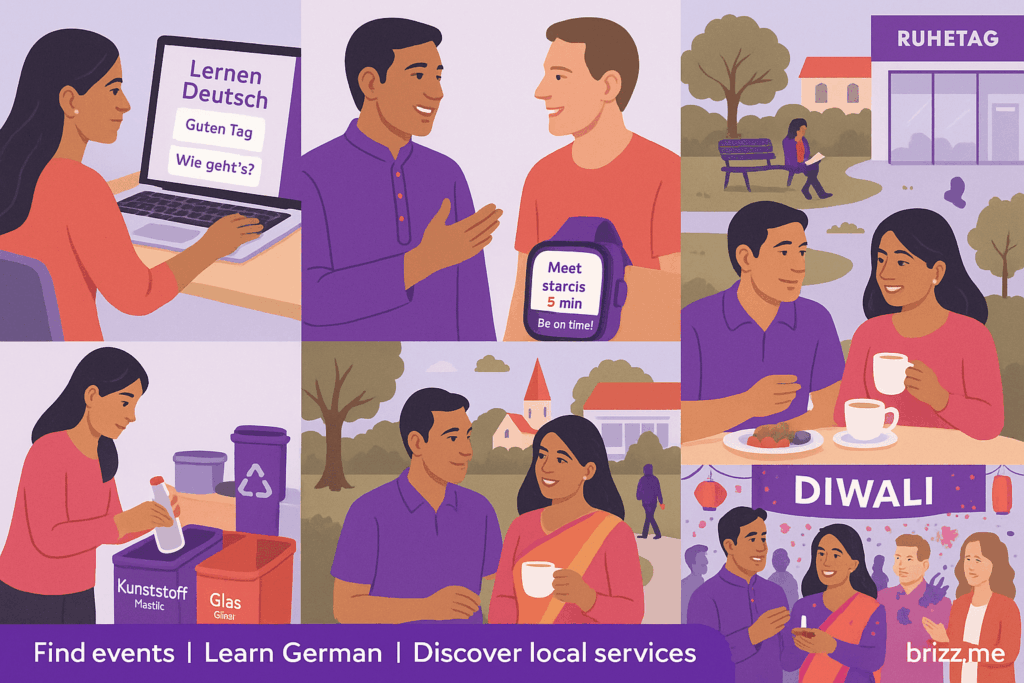
Adapting to a new culture is a part of the adventure. Here are a few things to unlock the German culture and etiquette:
- Germans are direct: Don’t mistake bluntness for rudeness. Germans value honesty and efficiency over small talk.
- Learn German: While English is acceptable in major cities, learning German in crucial for dealing with bureaucracy, securing a job, progressing your career and above all integrating socially. Make learning German a priority. You can learn German through various platforms. You can also find online German tutors on Brizz.me.
My tip: learn German, making new friends and being able to speak the basic language will make you feel a lot less lonely abroad.
👉 To know more about learning German in Germany and course structure, click here.
- Time is everything: Punctuality is non-negotiable — even 5 minutes late is considered disrespectful.
- Quiet Sundays (Ruhetag): Most shops and supermarkets close on Sundays. Gas stations, cinemas, and many restaurants stay open — perfect for a leisurely brunch, movie, or day out. Plan grocery runs in advance and use the free time for relaxation, exploring nature, or discovering local Indian events on Brizz.me.
- Recycle like a pro: Germany’s trash system will bewilder you at first, but you’ll soon sort plastic, paper, glass, and Pfand bottles in your sleep.
👉 Read our blog on Mülltrennung in Germany, the ultimate waste disposal guide
- Connect and Socialize with the desi community on Brizz.me: Brizz.me is a community-focused platform exclusively for Indian expats in Germany. It’s a platform for NRIs where you can discover, book and attend Indian events and festivals like Diwali and Holi and know more about local temples and cultural centers. Brizz.me also features a comprehensive Indian services directory and provides step-by-step relocation support to Germany through detailed blogs, making it easier for expats to connect with the Indian community abroad, find trusted services, and settle in smoothly.
👉 Check out our fun blog on German culture shocks for Indians
5. Relocating to Germany with Kids and family? Don’t Worry!
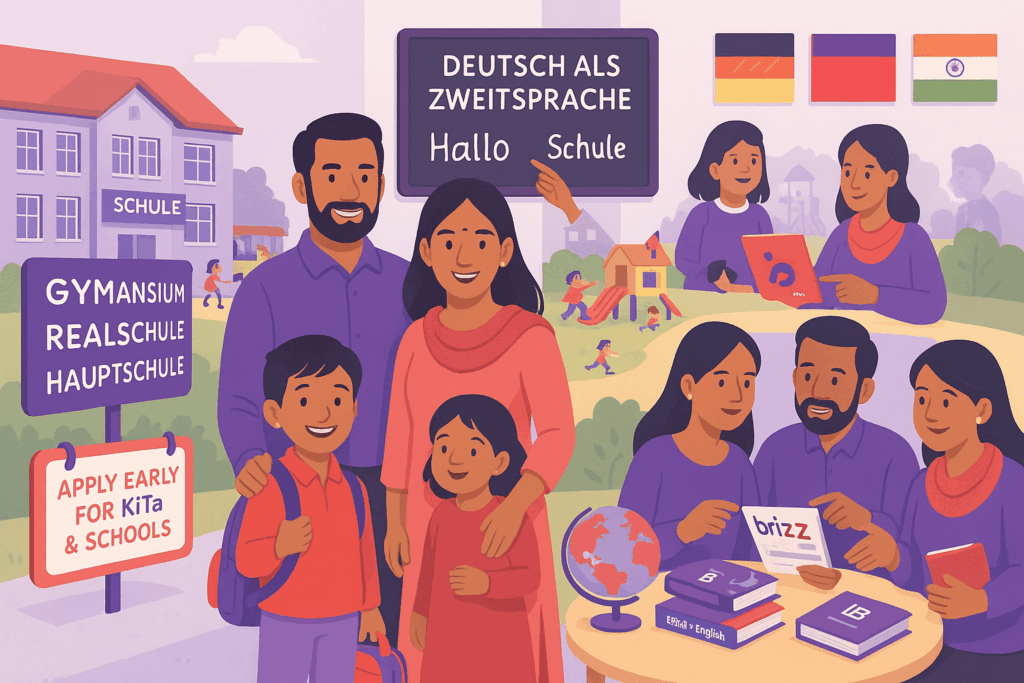
- KiTas (daycare) and Kindergartens: Apply early — spots are limited, and waiting lists can be long.
- German school system: After Grade 4, kids split into different school tracks based on performance: Gymnasium (academic), Realschule, or Hauptschule.
- Language support: Many schools offer “Deutsch als Zweitsprache” (German as a second language) for non-native speakers.
- Indian curriculum or English-medium options: International schools offering CBSE, IB, or bilingual education exist in major cities — perfect for families wanting continuity in education.
- Join parent support groups: Connect with other Indian parents to share textbook lists, car-pooling, after-school classes, and exam-prep tips. These communities are a lifesaver for settling in with kids.
👉 Read our full blog on schooling in Germany for Indian families
6. Jobs & Work Culture in Germany for Indian Professionals
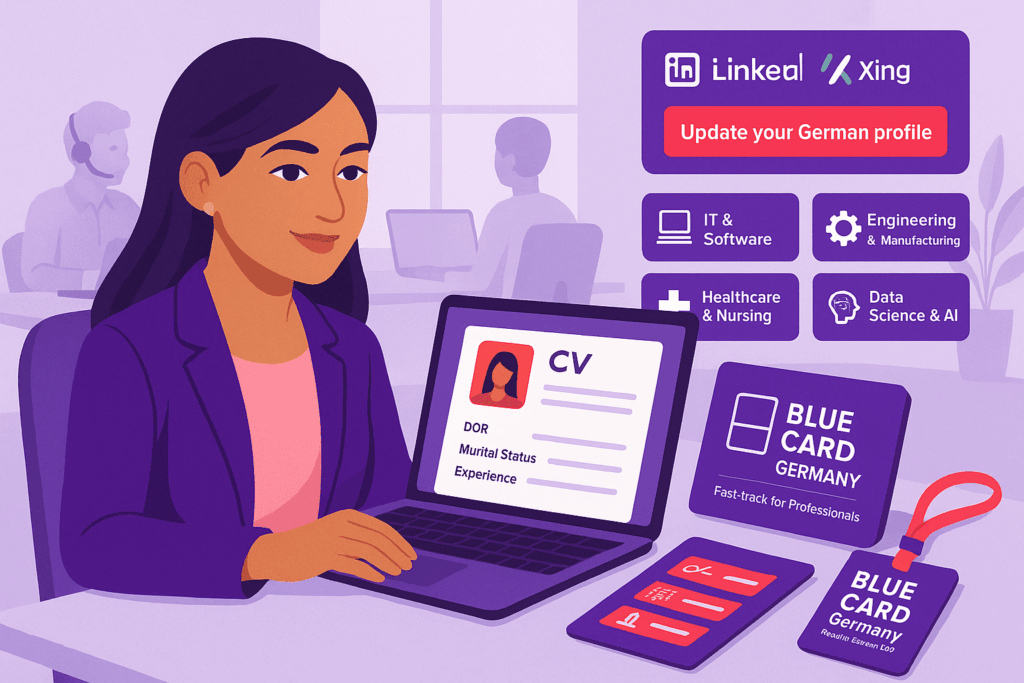
- Popular industries: IT & software, engineering, healthcare & nursing, data science & AI, automation & manufacturing, and research & development are particularly popular among Indians.
- German CVs are different: Keep it one-page, clean layout, and usually include your photo, date of birth, and marital status.
- Use LinkedIn and Xing: Xing is Germany’s own professional network. Build your profile on both for maximum visibility.
- Blue Card Germany: This is a fast-track work permit for highly skilled workers and a step toward permanent residency.
👉 Click on to read our guide on job hunting for Indians in Germany
7. Special Tips for Students
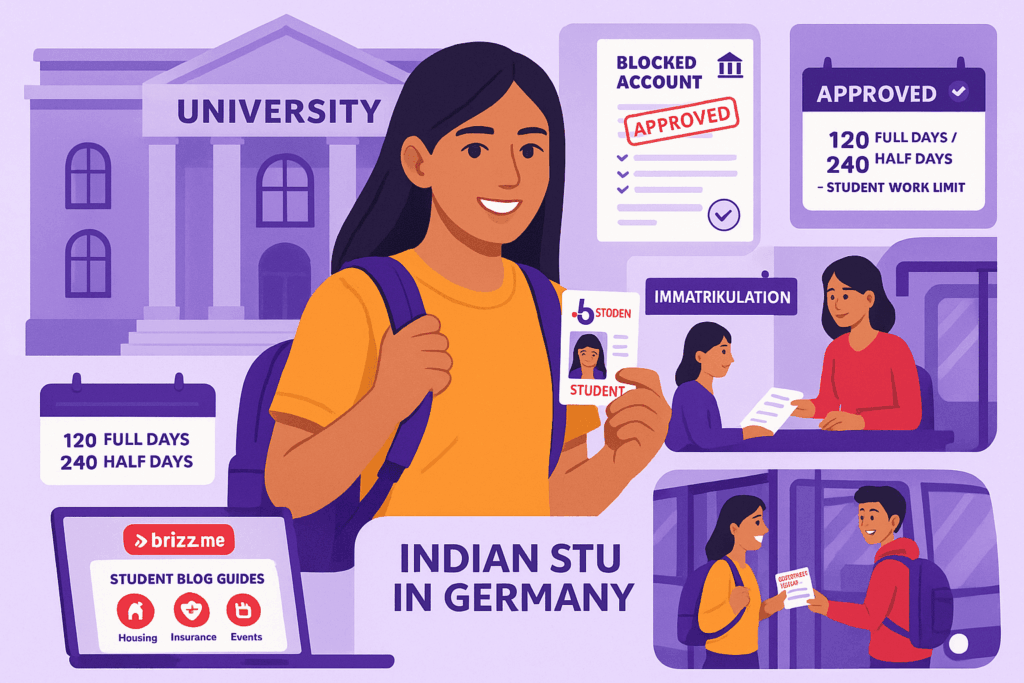
Studying in Germany involves a few extra steps. Here are the essentials you need to know:
- The Blocked Account (Sperrkonto): This is a mandatory requirement for your student visa, where you must deposit funds to prove you can finance your studies. The required blocked amount is € 992 per month or €11,904 for a 12 month visa.
- University Enrollment (Immatrikulation): After arriving, you must officially enroll at your university to get your student ID and access all services.
- Student Job Rules: International students are typically limited to working 120 full days or 240 half days per year or alternatively up to 20 hours per week.
- The Semester Ticket: A huge perk! Included in your university fees, this ticket usually offers unlimited public transport in your city or region.
Ready for your German adventure?
Leaving India for Germany isn’t just a geographical shift — it’s a cultural reboot, and one of the biggest adventures you’ll ever embark on. Yes, you’ll stumble sometimes (probably during Anmeldung 😅), but every hiccup teaches you something new.
Have a specific question about your situation? Drop it in the comments below or mail us at diya@ananthya.com! Our community of expats is here to help you out. Happy Brizzing!

